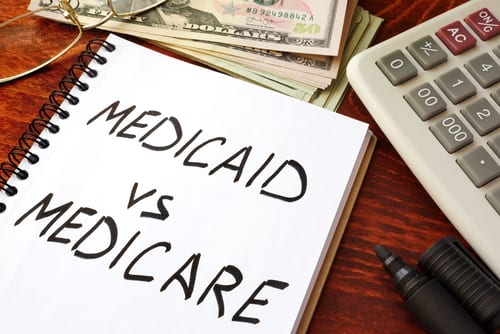Medicare and Medicaid have a lot in common. Both are government-funded and make medical treatments considerably more affordable. They have similar requirements to the point where some individuals can have both at once.
But, even with all the common features, the two are not the same.
How are they funded?
While the government funds Medicare and Medicaid, they are different in terms of the level of government. Medicare is federally funded – the eligibility requirements are the same for all U.S. citizens, the benefits are the same, and the costs are the same (aside from Medicare Advantage and Part D, which are exclusively sold through private insurance).
Medicaid is funded at both state and federal levels. Your finances are the deciding factor in whether you can obtain coverage, and that is based on your state’s requirement for Modified Adjusted Gross Income (MAGI).
Who qualifies?
With the exception of receiving disability benefits for at least 24 months, Medicare eligibility is strictly an age requirement. Anyone who is 65 or older qualifies for Medicare. You can also qualify while under 65 if you have a disability.
Medicaid eligibility is more inclusive, as it covers people of all ages. Income is the primary qualifier. Individuals receiving Social Security benefits, families with low income, and the medically needy are all included. Medicaid offers an option for those who earn above their state’s MAGI requirement to “spend down”, meaning they can deduct medical expenses from their annual earnings so that they can meet that requirement.
What are the differences in coverage?
Both Medicare and Medicaid offer coverage for inpatient and outpatient services, which includes hospital stays and preventive care. Each offers a significant discount that makes these services more affordable than they’d be otherwise. But the extent is varied.
Medicare’s coverage is standard, with prices known ahead of time. No matter where you live, your basic costs such as the Part A and B deductibles and coinsurance amounts are the same. With Medicaid, the costs are subject to more variables such as what your state covers, and how much you earn relative to others enrolled in the plan.
Medicaid is also different because it offers coverage for pregnant women and family planning, which is absent from Medicare’s benefits.
What happens if you have both?
If you qualify for both, you can receive Medicare and Medicaid coverage under the Dual Eligible Special Needs Plan (D-SNP) from Medicare Advantage. Here, you get all of Medicare Advantage’s benefits with additional savings from Medicaid.
Contact Turning 65 Solutions today!
Turning 65 Solutions gives you the opportunity to make an informed decision on affordable health plans. We eliminate all the confusion and the anxiety that can come with it so that you can be assured that you have the best plan that works for you. Call us today at 830-217-6711 for more information about how you can get Medicare and Medicaid.

